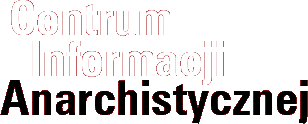Francja: Petycja ws. zatrzymanych aktywistów
 W różnych miastach Francji już organizowane komitety solidarnościowe z zatrzymanymi anarchistami z Tarnac. Przypomnimy, że mimo braku konkretnych dowodów, władze zatrzymały 20 anarchistów w powiązaniu z aktami sabotażu kolei TGV. Dziewięciu osobom postawiono zarzuty. Grupa CNT-AIT z Rouen organizowała już pierwszy protesty i koordynowała sieć grupy wsparcia.
W różnych miastach Francji już organizowane komitety solidarnościowe z zatrzymanymi anarchistami z Tarnac. Przypomnimy, że mimo braku konkretnych dowodów, władze zatrzymały 20 anarchistów w powiązaniu z aktami sabotażu kolei TGV. Dziewięciu osobom postawiono zarzuty. Grupa CNT-AIT z Rouen organizowała już pierwszy protesty i koordynowała sieć grupy wsparcia.
Internetowa petycja ruszy 1 grudnia. Grupa solidarnościowa już zbierała podpisy pod petycją o uwolnieniu anarchistów od znanych pisarzy i teoretyków. Wśród sygnatariuszy są m.in. Alain Badiou, Judith Butler, Giorgio Agamben, Slavoj Zizek, François Cusset, Isabelle Garo i Jacques Rancière. Od 1 grudnia wy także możecie podpisać petycję.
Poniżej publikujemy tekst petycji po angielsku. Możesz już teraz wysłać email solidarnościowy!
www.soutien11novembre.org
http://tarnac9.wordpress.com/
Zobacz też komentarz Giorgio Agambena na temat represji.
Petition written by Eric Hazan
You may sign it (name, occupation, city) and return it to:
A recent operation by the French police, intensively covered by the French and to some extent international media, ended in the arrest and indictment of nine people under anti-terrorist laws. The nature of this operation has already undergone a change: after the revelation of inconsistency in the accusation of sabotaging French railway lines, the affair took a manifestly political turn. According to the public prosecutor: "the goal of their activity is to attack the institutions of the state, and to upset by violence--I emphasize violence, and not contestation which is permitted--the political, economic and social order."
The target of this operation is larger than the group of people who have been charged, against which there exists no material evidence, nor anything precise they can be accused of. The charge of "criminal association for the purposes of terrorist activity" is exceptionally vague: what constitutes "association", and how are we to understand the reference to "purposes" other than as a criminalization of intention? As for the qualification "terrorist", the enforced definition is so broad that it could apply to practically anything--and to possess such and such a text or to go to such and such demonstration is enough to fall under this exceptional legislation.
The individuals who have been charged were not chosen at random, but because they lead a political existence. They have participated in demonstrations, most recently against the less than honorable European summit on immigration in Vichy. They think, they read books, they live together in a remote village. There has been talk of clandestinity: they have opened a grocery store, everyone knows them in the region, where a support committee has been organized against their arrest. What they are looking for is neither anonymity nor refuge, but rather the contrary: another relation than the anonymous one of the metropolis. In the end, the absence of evidence itself becomes evidence against them: the refusal of those who have been charged to give evidence against one another during their detention is presented as a new indication of their terrorism.
In reality, this whole affair is a test for us. To what degree are we going to accept that anti-terrorism permits anyone to be arrested at any time? Where are we to place the limit of freedom of expression? Are emergency laws adopted under the pretext of terrorism and security compatible with democracy in the long term? Are we ready to let the police and the courts perform an about-turn in the direction of a new order? It is for us to respond to these questions, and first by demanding the end of these investigations and the immediate release of these nine people whose indictment is meant as an example for us all.






